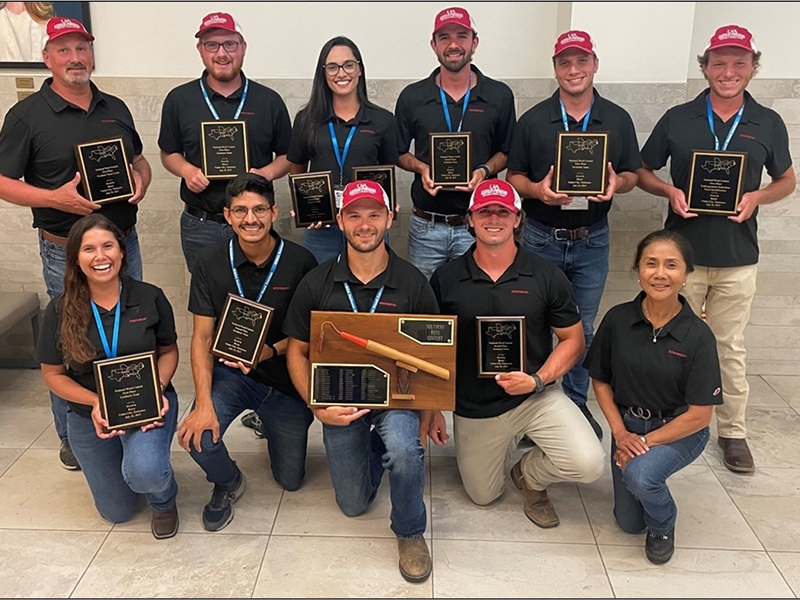
The U of A weed science team, made up of students in crop, soil and environmental sciences in the Dale Bumpers College of Agricultural, Food and Life Sciences, won the 2023 National Weed Contest held in Union City, Tennessee, in July.
The team, including graduate students Tristen Avent, Pamela Carvalho-Moore, Jared Smith and Sam Noe, also won the Southern Weed Science Society regional contest.
In addition, the U of A took a second team, and that group of graduate students — Maria Carolina Souza, Tanner King, Cole Woolard and Juan Camilo Velasquez — placed second in the SWSS Contest.
Overall, 67 teams and 217 students from across the country and Canada participated. The national competition is a joint activity between the Northeastern, North Central, Southern and Western weed science societies.
The contest emphasizes application of scientific knowledge to solve problems in a real-world environment. It is a collaborative effort among participating universities and industry partners, with those partners investing time and resources into the event in order to help develop its future workforce. Each student performs individual written calibration tests, weed identification, unknown herbicide identification and farmer problem diagnosis. Teams are also scored in sprayer calibration.
"Our weed science research is one of our largest and most active research programs," said Jeff Edwards, CSES department head. "These students and coaches conduct research throughout eastern Arkansas, which requires long days and extensive travel. They all find time to practice in early mornings, evenings and on weekends. It is not uncommon to see students and coaches in the field on a Saturday morning at daylight reviewing herbicide symptomology or working through farmer problems."
Students take weed identification tests on Sundays in preparation for early Monday morning trips to various research stations across the state.
In addition to the two teams, one undergraduate student represented the U of A and won two titles. Crop science major Rhet Baxley won the undergrad Weed Identification portion of the contest in both the regional and national rounds.
Smith led the way for the national championship squad with regional and national individual titles in the Herbicide Symptomology and Weed Identification categories, and the regional title in the Farmer Problem category. He was the top-ranked individual in both the regional and national contests.
Avent won the Written Calibration division at both the regional and national levels, and tied Smith for first in the Herbicide Symptomology category.
Avent and Souza were the second and third-ranked individuals in the graduate student division at the regional contest.
Carvalho-Moore, King, Woolard and Noe placed fourth, fifth, sixth and eighth, respectively, in the overall individual regional standings.
All nine students were coached by professor of weed physiology and molecular biology Nilda Roma-Burgos and Distinguished Professor and Elms Farming Chair of Weed Science Jason Norsworthy.
Roma-Burgos and Norsworthy and both faculty members in Bumpers College and researchers and scientists with the Arkansas Agricultural Experiment Station, the research arm of the U of A System Division of Agriculture.
"Conducting the weed contest and preparing to participate in it requires major investments of time and resources," Roma-Burgos said. "Yet its value for training future professionals in weed science and agriculture in general cannot be overstated. This activity has reached international acclaim. The Weed Science Society of Brazil conducted its first national weed contest in 2017 and regional weed contests before that, following the SWSS Weed Contest format. Similarly, the Weed Science Society of India conducted its first weed contest in 2020, also patterned after the SWSS Weed Contest."
U of A's weed science team won the regional title last year.
The Weed Science Society of America promotes research, education and extension outreach activities related to weeds; provides science-based information to the public and policy makers; and fosters awareness of weeds and their impacts on managed and natural ecosystems.
About the Dale Bumpers College of Agricultural, Food and Life Sciences: Bumpers College provides life-changing opportunities to position and prepare graduates who will be leaders in the businesses associated with foods, family, the environment, agriculture, sustainability and human quality of life; and who will be first-choice candidates of employers looking for leaders, innovators, policy makers and entrepreneurs. The college is named for Dale Bumpers, former Arkansas governor and longtime U.S. senator who made the state prominent in national and international agriculture. For more information about Bumpers College, visit our website, and follow us on Twitter at @BumpersCollege and Instagram at BumpersCollege.
About the University of Arkansas: As Arkansas' flagship institution, the U of A provides an internationally competitive education in more than 200 academic programs. Founded in 1871, the U of A contributes more than $2.2 billion to Arkansas' economy through the teaching of new knowledge and skills, entrepreneurship and job development, discovery through research and creative activity while also providing training for professional disciplines. The Carnegie Foundation classifies the U of A among the few U.S. colleges and universities with the highest level of research activity. U.S. News & World Report ranks the U of A among the top public universities in the nation. See how the U of A works to build a better world at Arkansas Research and Economic Development News.
Topics
Contacts
Robby Edwards, director of communications
Dale Bumpers College of Agricultural, Food and Life Sciences
479-575-4625,